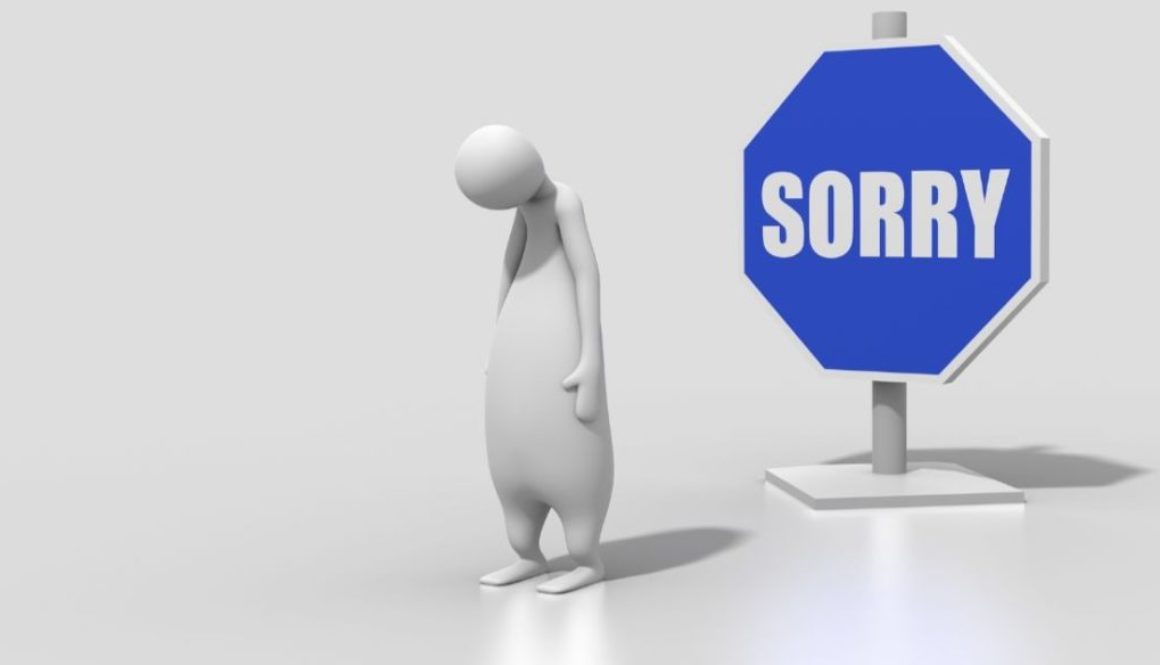Saying you’re sorry and making up for mistakes

Saying you’re sorry can be difficult. To me it ranks on the top three list together with asking for help and with saying I want you to love me. We’re practicing saying sorry in my family. It’s been interesting and educational for me to observe it from the outside. When I see it happen between my daughters it’s easier to notice the patterns and obstacles that I also struggle with.
Hurting someone is usually not intentional
There are many issues that might make it difficult to say you’re sorry. One is the fact that it’s usually never intentional when you hurt someone. The thing you did or said wasn’t meant the way it was interpreted. Communication can be really tricky.
Have you ever gotten upset with someone because of how they got hurt by something you did/said? “How can she be so sensitive!?” “Gee there is so much drama going on!” The thing is that some people, like me, sometimes have trouble differentiating between who they are and what they do. If you feel that you are a bad person when you do something “wrong” then you’ll have a hard time saying I’m sorry. Saying it will mean that you admit to being a bad person – not very many people enjoy that and most will go to great length to defend themselves.
You want to protect yourself. You want to explain and make the other person realize how it was wrong by to be hurt in the first place. That way you don’t have to say you’re sorry – you’ve proven that you didn’t do anything wrong. In these circumstances it might help to remember that people, yourself included aren’t bad – they might make bad decisions but that doesn’t make them bad people.
Hurting someone you care about truly sucks even without the pressure of I’m a bad person. Just seeing pain in the face of loved ones hurts inside.
I asked my daughter about apologizing
I wanted to understand how my daughter felt about saying sorry. She told me some interesting stuff:
“Sometimes it’s hard because you really only just want to forget about the situation. You might feel so bad about it that you don’t want to risk bringing it up again. Since you don’t know how the other might react and they might want to talk about it a lot.”
“Sometimes you might get a sinking feeling in your stomach when you’ve hurt someone – if that happens I try to remind myself that I didn’t mean to- that makes it easier to say I’m sorry”.
”When you say you’re sorry you should really mean it because it’s very important how you say it. There’s a huge difference between “SORRY!” with an angry voice or “oooooh nooo I’m SO sorry!” with a sad voice”
Learning empathy
Having the ability to understand how others might feel in different situation is essential for learning to say you’re sorry.
Empathy is something we develop and learn as we grow, some more than others. I was kind of shocked when my girls would do something I thought was totally wrong. Like when big sister, then 3 years old hit her little sister (1 year at the time) or when they kept running after the birds on the plaza chasing and scaring them. I worried that somehow they didn’t realize how they might be hurting someone else. Well.. they couldn’t. Empathy is something we need to learn.
Children learn empathy primarily by watching their parents. There is a term for this, Social referencing, that describes how young children look to their parent to get help in deciding on how to feel and react. Has your kid ever fallen down and immediately turned to you to check how to react? If you as the parent show distress and worry the child immediately starts crying. On the other hand if you just pick her back up with a smile or say “up you go!” then the chances are that she brushes herself of and continue with her play.
Remember how it feels when you are hurt
If you unintentionally hurt someone the best thing is to accept that it has happened. It might feel unfair or that you don’t have the time or energy to handle the misunderstanding. But if you fight the fact that it happened you’ll only loose more time trying to repair the damage to the relationship later. Don’t try to persuade someone not to feel what they feel. The feeling is there and needs to be acknowledged. I’m not saying that people have the right to accuse you or demand things from you. I’m just saying that people that feel hurt needs to be listened to before you can find a suitable solution together.
Try to take full responsibility for being part of the situation that has left someone hurt. Use your empathy to remember how it feels when YOU feel hurt. You don’t have to agree on why the person is hurt or even pretend to understand why if you don’t. You just have to remember the feelings in your body when you get hurt. Remember the anger, the sadness and the sense of loss.
When you can connect to the feeling, outside of the situation, you’re better prepared to be empathetic in your communication.
Saying you’re sorry
Owning up to having been part of a situation that has hurt someone includes actually apologizing. As my daughter noted; “It’s hard but it’s important that you say it because that can bring your friendship back”.
Feelings are messengers and the feeling of hurt is coming from feeling you’ve lost something. If someone is sad because of something being lost between you, doesn’t that mean that what you had was important to that person? It’s kinda nice to be important to people J
So what steps are important for saying the actual words of “I’m sorry” and getting the desired result of understanding, a repaired and maybe even a stronger relationship?
Take 100% ownership for inflicting pain on the other person. It doesn’t matter that it wasn’t intentional! It happened no one can be wrong about having feelings. This is the possibly hardest part and it might help to remember to ask yourself the important question of; Do you want to be right or do you want to be happy?
When you’ve done your mental homework these steps might help:
- Say you’re sorry for causing the hurt.
“I realize I hurt you and I am truly sorry for causing you pain” - You can move on to explaining your reasons for your actions but this needs to be cautioned. There is a risk that the explanation turns into excuses that will make the other person feel like you’re still trying to argue for being right.
“I didn’t want to worry you and I thought it’d be better not to tell you about that thing beforehand” - If you think you know and understand why the other person was hurt the say so. Tell what you’ve learnt and will do differently in the future.
“I realize you felt left out and that I kept secrets from you when I didn’t tell you. Next time I will tell you even if I think you might get worried.”If you don’t know why the person got hurt ask them.
“I realize now that I missed something that hurt you. I don’t know what it is but I’d really love know so I can understand and not do that in the future. Will you tell me?”
Saying you’re sorry requires vulnerability
Saying you’re sorry leaves you open to being accepted or denied. It’s a scary thing. Sometimes the one that got hurt needs time and space to receive the apology. Try to stay open and available for picking up the dialogue when the other is ready.
